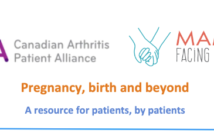The 2023 American College of Rheumatology (ACR) Convergence conference was held in November in San Diego, CA, with approximately 13,000 health care providers, clinicians, researchers, and patients from all over the world in attendance.
Fertility Preservation in Women
Planning for a pregnancy when you live with a rheumatic disease is vital, whether you are male or female. Certain medications should be stopped prior to trying to conceive, which makes the whole journey a little more challenging for a person living with a rheumatic disease, such as rheumatoid arthritis, psoriatic arthritis, ankylosing spondylitis, or lupus. It’s important to keep an open line of communication with and between your rheumatologist and OB/GYN if you’re of a child-bearing age, whether starting a family is in your future or not.
Avoiding pregnancy is important for patients with rheumatic disease if:
- You have high disease activity.
- You have severe disease-related damage.
- Are taking teratogenic medications.
Many people with a rheumatic disease face challenges and a lot of concerns when it comes to family planning. What effect does my medication have on my ability to conceive? Will I be able to get pregnant? How will my disease react during pregnancy? What if I get pregnant while on medications that could be harmful? These concerns can play a significant role in family planning decisions.
At the 2023 American College Rheumatology Annual Meeting, Bonnie L. Bermas, MD, from UT Southwestern Medical Center in Dallas, discussed the main factors related to infertility in persons with rheumatic disease: choice, disease activity impact, and medication impact. Patients are concerned about their ability to care for children, the effect medications could have on a baby, and concern about passing on the disease to their child.
Timing is everything when it comes to pregnancy in general, and when you have a rheumatic disease to consider, it can often mean a delay in starting a family, which contributes to other factors that can affect fertility, like age and family size.
Lisa Sammaritano, MD, with the Hospital for Special Surgery and Weill Cornell Medicine, played a key role in the development of the ACR guidelines for managing reproductive health.
Sammaritano started her presentation stating, “Age is the biggest factor impacting our patients’ ability to plan a family.”
A research study of 1,933 women with rheumatic disease from Norway compared to a group of 672,691 healthy women showed that women with rheumatic disease had a lower number of children (Skomsvoll et al, 2001). While another study showed 55% of women with rheumatoid arthritis and 64% of women with systemic lupus erythematosus (SLE) had fewer children than they originally planned (Clowse et all, 2012).
Bermas discussed research showing women with rheumatoid arthritis have a longer time to pregnancy than other healthy women, with 25% taking over 12 months to conceive in comparison to 15.6% of the reference group of women (Jawaheer et al, Arthritis Rheum 2011).
One concern has been whether women with rheumatic disease have reduced ovarian reserves. One way to evaluate ovarian reserve is by measuring the Anti-Mullerian Hormone. However, Bermas shared research showing there was no significant difference of Anti-Mullerian hormone in patients with 86 Lupus patients compared to 44 patients in a control group.
Ovarian function in women with rheumatoid arthritis was measured in another study, which showed a decrease in ovarian function in women with rheumatic disaese, but not all studies substantiate this theory, Bermas concluded.
Many patients are concerned that their medications will affect their fertility. However, Bermas stated, “Really, the only medication we use as rheumatologists that impairs ovarian function is Cyclophosphamide (Cytoxan) and can contribute to ovarian failure.”
Research related to lupus patients taking Cyclophosphamide has shown a reduction in ovarian reserves; however, Bermas reports most rheumatologists have moved away from using this medication as a first line of treatment for rheumatic diseases.
A meta-analysis of fertility preservation in women with lupus, treated with Cyclophosphamide, who were also given a gonadotropin-releasing hormone (GnRH) treatment at the same time, showed the GnRH reduced the impact of the medication on its effects of fertility. GnRH stimulates the production of follicle-stimulating hormone (FSH) and luteinizing hormone (LH), which is vital to your reproductive health.
For both men and women who may be taking Cyclophosphamide, it is strongly recommended to discontinue taking it 12 weeks prior to conception, according to the 2020 American College of Rheumatology Guidelines for the Management of Reproductive Health in Rheumatic and Musculoskeletal Diseases.
Taking non-steroidal anti-inflammatory drugs (NSAIDS) is common when you have a rheumatic condition. Some research indicates NSAIDS may inhibit ovulation as well as implantation, however, there is conflicting results from various studies related to NSAIDS effects on fertility.
Bermas recommends her female patients stop taking NSAIDS if they’re experiencing a delay in conception. “If it’s taking a few cycles where you think you’ve had an early pregnancy or miscarriage, then hold NSAIDS,” says Bermas.
Fertility Preservation in Men
Historically, when thinking about fertility in patients living with a rheumatic disease, health care providers and researchers focused on the effects medications and the disease process may have had on women. Bermas also presented research focused on sexual function for men living with rheumatic conditions. Here are some key findings, based on a systematic review of research:
- Researchers found sexual dysfunction higher amongst men with rheumatoid arthritis than in healthy controls, due to pain, fatigue, and high disease activity.
- Male patients with rheumatoid arthritis who had active disease were found to have lower DHEA, a hormone the body naturally produces in the adrenal gland that helps produce other hormones, including testosterone and estrogen.
- Lower sperm counts and sperm abnormalities have been reported in males with systemic lupus erythematosus (SLE), exclusive of Cyclophosphamide use.
- Anti-sperm antibodies have been reported in SLE male patients.
Bermas provided some medication guidance for men with rheumatic diseases as it relates to fertility:
- The use of Cyclophosphamide can cause irreversible infertility.
- Males treated with Cyclophosphamide should be referred for sperm cryopreservation.
- Discontinue the use of Cyclophosphamide three months prior to conception.
- Sulfasalazine can cause reversible azoospermia (absence of sperm). Only discontinue medication if there’s a delay in conception and conduct a semen analysis.
For most men with rheumatic disase, the factor of most concern affecting fertility is the level of disease activity. High disease activity can have an impact on fertility, so getting the disease under control is a top priority for men when considering starting a family.
Planning ahead and open communication with your rheumatologist about your medications, disease activity, and their effects on family planning is imperative.
More detailed guidance can be found in the 2020 American College of Rheumatology Guidelines for the Management of Reproductive Health in Rheumatic and Musculoskeletal Diseases. Share this information with your rheumatologist as you begin to consider your family planning options.
Speakers at ACR Presentation:
Bonnie L. Bermas, MD; UT Southwestern Medical Center, Dallas
Lisa Sammaritano, MD; Hospital for Special Surgery; Weill Cornell Medicine




